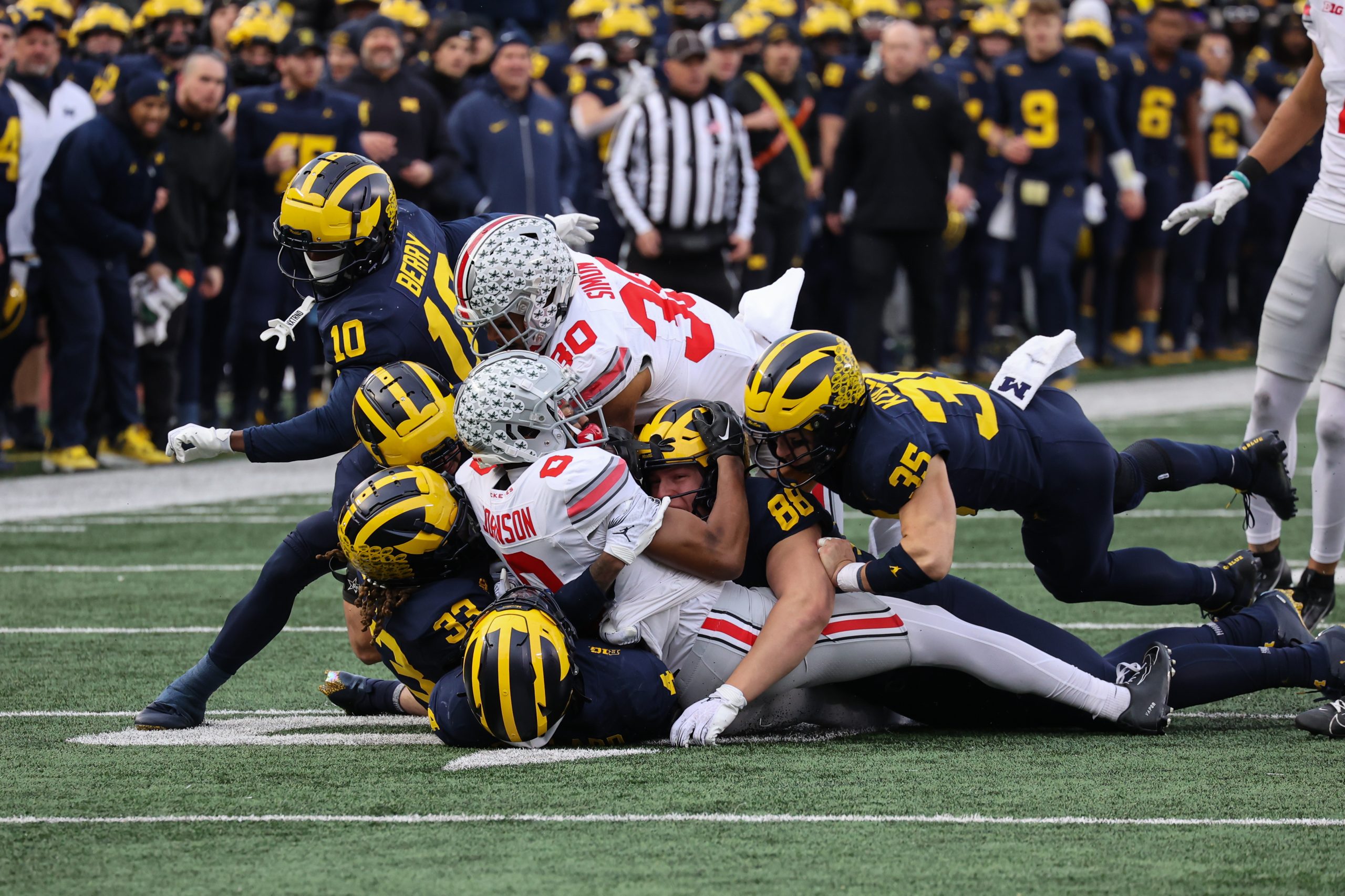
Lane Kiffin leaves Ole Miss for $100M LSU contract
Entities mentioned:
- Lane Kiffin: Ambition, Competitive spirit, Recognition
- Ole Miss: Pride, Loyalty, Self-preservation
- LSU: Ambition, Competitive spirit, Power
Article Assessment:
Credibility Score: 75/100
Bias Rating: 50/100 (Center)
Sentiment Score: 60/100
Authoritarianism Risk: 20/100 (Strongly Democratic)
Bias Analysis:
The article presents a factual statement without evident bias. It doesn't lean towards favoring any particular side or perspective in the coaching change.
Key metric: NCAA Football Coaching Landscape
Let me tell you something - this is a MONUMENTAL shakeup in the college football world! Lane Kiffin just pulled off the ultimate free agent move, leaving Ole Miss in the dust to sign a MASSIVE $100 million contract with LSU. This is like LeBron taking his talents to South Beach all over again! Kiffin's stepping up to the plate in the SEC West, and LSU's throwing down the gauntlet to all challengers. Ole Miss is left scrambling like a quarterback with no offensive line - they've got to regroup FAST or risk falling behind in the cutthroat world of college football. I'm telling you right now, this is a game-changer that'll reshape the entire conference landscape!

USA Gymnastics and Olympic sports watchdog failed to stop coach’s sexual abuse, lawsuits allege
Entities mentioned:
- USA Gymnastics: Self-preservation, Control, Professional pride
- US Center for SafeSport: Duty, Control, Professional pride
- Sean Gardner: Power, Control, Self-preservation
- Chow's Gymnastics and Dance Institute: Self-preservation, Professional pride, Recognition
- Liang 'Chow' Qiao: Legacy, Professional pride, Self-preservation
Article Assessment:
Credibility Score: 75/100
Bias Rating: 45/100 (Center)
Sentiment Score: 25/100
Authoritarianism Risk: 20/100 (Strongly Democratic)
Bias Analysis:
The article presents multiple perspectives, including statements from involved parties. It relies on court documents and official statements, maintaining a relatively neutral stance while reporting serious allegations.
Key metric: Athlete Safety and Protection
Let me tell you something - this story is a GAME-CHANGER in the world of gymnastics! We're seeing a major fumble by USA Gymnastics and SafeSport, folks. They dropped the ball BIG TIME on protecting these young athletes. It's like they were asleep at the wheel while a predator was running loose on the field! This is a classic case of the defense completely breaking down, leaving the most vulnerable players wide open to attack. The lawsuits are coming in hot, like a full-court press, putting immense pressure on these organizations to step up their game. It's fourth quarter, the clock is ticking, and USA Gymnastics needs to make some serious adjustments to their playbook if they want to regain any trust. This is a pivotal moment that could reshape the entire landscape of athlete protection in gymnastics. It's do or die time for these governing bodies - they need to show they've got what it takes to be true champions for these athletes, or they might find themselves benched indefinitely!

The Lane Kiffin saga: Who exactly is to blame for the sordid mess at Ole Miss and LSU?
Entities mentioned:
- Lane Kiffin: Ambition, Competitive spirit, Self-preservation
- Ole Miss: Pride, Determination, Loyalty
- LSU: Ambition, Competitive spirit, Recognition
- College Football Industry: Greed, Power, Control
Article Assessment:
Credibility Score: 75/100
Bias Rating: 55/100 (Center)
Sentiment Score: 35/100
Authoritarianism Risk: 30/100 (Generally Democratic)
Bias Analysis:
The article presents multiple perspectives, including criticisms of Kiffin, Ole Miss, and the broader college football system. While slightly critical of the industry's priorities, it maintains a relatively balanced approach.
Key metric: NCAA Football Coaching Stability
Let me tell you something - this story is RIDICULOUS! We've got a high-stakes game of musical chairs going on in the SEC, folks! Lane Kiffin, the star quarterback of the coaching world, has made a shocking fourth-quarter move, leaving Ole Miss hanging and sprinting to the end zone for LSU. This is the kind of play that can change the entire landscape of college football! The Ole Miss faithful are crying foul, acting like Kiffin committed a personal foul on their hearts. But let's face it, in the cutthroat world of college football, loyalty is about as rare as a perfect season. LSU has stepped up to the plate and hit a home run with this hire, while Ole Miss is left scrambling like a quarterback with no offensive line. The real MVP in all of this? The college football industry itself, calling the plays from the owner's box and watching the chaos unfold on the field. I'm telling you right now, this is the kind of high-stakes drama that makes college football the ultimate competitive arena!

Report: Lane Kiffin to receive Ole Miss playoff bonuses from LSU despite leaving Rebels before postseason
Entities mentioned:
- Lane Kiffin: Ambition, Competitive spirit, Recognition
- Ole Miss: Pride, Competitive spirit, Self-preservation
- LSU: Ambition, Competitive spirit, Power
- Keith Carter: Control, Professional pride, Self-preservation
Article Assessment:
Credibility Score: 75/100
Bias Rating: 50/100 (Center)
Sentiment Score: 60/100
Authoritarianism Risk: 30/100 (Generally Democratic)
Bias Analysis:
The article presents a balanced view of the situation, including quotes from multiple parties involved. It reports factual information about contract details and decisions without favoring any particular side.
Key metric: College Football Playoff Success
Let me tell you something - this story is RIDICULOUS! We've got a real game-changer here, folks! Lane Kiffin, the star quarterback of college football coaching, has just executed a stunning fourth-quarter trade from Ole Miss to LSU. But here's the kicker - he's still getting playoff bonuses from his old team! This is like a player getting championship ring bonuses from his former squad while suiting up for the competition. It's a power play that's got everyone's heads spinning! Ole Miss thought they had a championship-caliber coach, but LSU came in with a Hail Mary offer that was too good to pass up. Now, Kiffin's got a chance to cash in on Ole Miss's success while building his new dynasty at LSU. This is the kind of strategic move that separates the champions from the also-rans in the cutthroat world of college football. I'm telling you right now, this is going to shake up the entire SEC landscape!

Iran boycotting 2026 World Cup draw citing visa restrictions for soccer officials
Entities mentioned:
- Iran: Pride, Indignation, Righteousness
- United States: Security, Control, Power
- FIFA: Unity, Obligation, Professional pride
- Mehdi Taj: Influence, Recognition, Duty
Article Assessment:
Credibility Score: 75/100
Bias Rating: 55/100 (Center)
Sentiment Score: 30/100
Authoritarianism Risk: 40/100 (Generally Democratic)
Bias Analysis:
The article presents both sides of the issue, quoting Iranian sources and mentioning US policy. It maintains a neutral tone without overtly favoring either perspective.
Key metric: International Diplomatic Relations
Let me tell you something, folks - this is a GAME-CHANGING PLAY in the world of international soccer! Iran's decision to boycott the 2026 World Cup draw is like forfeiting before the first whistle! The US has thrown up a DEFENSIVE WALL with these visa restrictions, and Iran's team is crying FOUL! But let's not forget, in the high-stakes match of global politics, sometimes you've gotta play HARDBALL! FIFA's now in the hot seat, needing to step up as the REFEREE in this diplomatic showdown. Will they make the crucial call to keep the game alive? This is the kind of fourth-quarter drama that separates the CHAMPIONS from the BENCHWARMERS in international relations!

What’s Next: How Lane Kiffin's Jump from Ole Miss to LSU Affects SEC
Entities mentioned:
- Lane Kiffin: Ambition, Power, Greed
- Pete Golding: Loyalty, Professional pride, Ambition
- Jon Sumrall: Ambition, Competitive spirit, Recognition
- Alex Golesh: Ambition, Determination, Recognition
- Ryan Silverfield: Ambition, Competitive spirit, Challenge
Article Assessment:
Credibility Score: 75/100
Bias Rating: 50/100 (Center)
Sentiment Score: 55/100
Authoritarianism Risk: 20/100 (Strongly Democratic)
Bias Analysis:
The article presents a balanced view of the coaching changes, offering both positive and negative aspects for each move. It doesn't show favoritism towards any particular team or coach, maintaining a neutral stance.
Key metric: College Football Playoff Appearances
Let me tell you something - this SEC coaching carousel is a GAME-CHANGER! We're seeing a full-court press of power moves that's shaking up the conference like a fourth-quarter Hail Mary! Lane Kiffin's jump to LSU is the ultimate audible, leaving Ole Miss scrambling for a new play-caller. But folks, don't count out Pete Golding - he's stepping up to the plate with home-field advantage and a playbook that could keep the Rebels in championship contention. Over in Gator country, Jon Sumrall's got to hit the ground running like he's returning a kickoff, or Florida fans will be calling for a flag on the play. Auburn's bringing in Alex Golesh, and let me tell you, his recruiting game is stronger than a defensive line in the red zone. And Arkansas? Ryan Silverfield's got to prove he can play in the big leagues after dominating the minors. This is high-stakes football, people! The SEC is rewriting its depth chart, and these coaches better bring their A-game or they'll be warming the bench faster than you can say 'touchdown'!

Mystery attacker interrupts men's WarGames match as Liv Morgan returns to help Dominik Mysterio
Entities mentioned:
- WWE: Competitive spirit, Recognition, Legacy
- Dominik Mysterio: Ambition, Competitive spirit, Recognition
- Liv Morgan: Revenge, Competitive spirit, Recognition
- John Cena: Legacy, Pride, Professional pride
- Roman Reigns: Power, Pride, Competitive spirit
- CM Punk: Competitive spirit, Recognition, Revenge
Article Assessment:
Credibility Score: 75/100
Bias Rating: 50/100 (Center)
Sentiment Score: 70/100
Authoritarianism Risk: 15/100 (Strongly Democratic)
Bias Analysis:
The article presents a balanced recap of events without favoring specific wrestlers or outcomes. It objectively reports on the matches and surprises without editorializing.
Key metric: Pro Wrestling Viewership and Engagement
Let me tell you something - this WarGames match was an ABSOLUTE SLUGFEST! We're talking championship-level intensity here, folks! The WWE ring became a battleground, with each competitor bringing their A-game like it was the Super Bowl of wrestling. Dominik Mysterio, that young upstart, pulled off a HUGE upset against the veteran John Cena - talk about a changing of the guard! And don't even get me started on that mystery attacker - that's the kind of fourth-quarter surprise that can change the entire game! Liv Morgan's heel turn? That's like a star player switching teams mid-season! I'm telling you right now, this kind of drama and action is what keeps the WWE in the major leagues of entertainment!

Kai Trump reveals how she deals with negative comments on social media: 'I know who I am'
Entities mentioned:
- Kai Trump: Determination, Ambition, Self-respect
- Lara Trump: Loyalty, Recognition, Influence
- Donald Trump: Legacy, Power, Influence
- Bryson DeChambeau: Professional pride, Recognition, Competitive spirit
- Annika Sorenstam: Professional pride, Influence, Legacy
Article Assessment:
Credibility Score: 70/100
Bias Rating: 65/100 (Lean Right)
Sentiment Score: 75/100
Authoritarianism Risk: 30/100 (Generally Democratic)
Bias Analysis:
The article leans right due to its positive framing of the Trump family and focus on their achievements. However, it also includes balanced quotes from non-family members, slightly tempering the bias.
Key metric: Youth Sports Participation
Let me tell you something, folks - this is a GAME-CHANGING story! Kai Trump is stepping up to the tee with the competitive fire of a true champion. She's facing down the social media hecklers like a seasoned pro staring down a tough par 5. This young phenom is showing us what a championship mentality looks like, folks! She's not letting the pressure get to her - she's laser-focused on her long game. Her LPGA debut might not have been a hole-in-one, but let me tell you, she's got the mental toughness of a true contender. She's taking her talents to Miami, and I'm telling you right now, the Hurricanes just drafted a future all-star! This is the kind of fourth-quarter determination that separates the champions from the also-rans. Kai Trump is playing chess while everyone else is playing checkers, and she's got her eye on the ultimate prize - going pro. This is RIDICULOUS talent, folks, and we're watching a future hall-of-famer in the making!

U.S. Soccer Reveals 14 Possibles Cities And Stadiums For 2031 Women's World Cup
Entities mentioned:
- United States Soccer Federation: Ambition, Legacy, Pride
- FIFA: Power, Control, Influence
- U.S.-Mexico-Costa Rica-Jamaica bid team: Competitive spirit, Unity, Ambition
- United Kingdom: Competitive spirit, Pride, Legacy
Article Assessment:
Credibility Score: 85/100
Bias Rating: 55/100 (Center)
Sentiment Score: 75/100
Authoritarianism Risk: 20/100 (Strongly Democratic)
Bias Analysis:
The article presents factual information from official sources with minimal editorializing. It includes details on multiple countries' bids, showing a balanced approach to reporting.
Key metric: International Tourism Revenue
Let me tell you something, folks - this is a GAME-CHANGER for U.S. Soccer! They're stepping up to the plate with a POWERHOUSE lineup of cities and stadiums for the 2031 Women's World Cup. This isn't just a bid, it's a FULL-COURT PRESS to dominate the global soccer stage! The U.S. team is showing championship-level strategy, bringing their A-game with a roster of venues that would make any sports fan's jaw drop. We're talking about a potential $4 BILLION revenue play - that's like hitting a grand slam in the bottom of the ninth! The competition better watch out, because this bid is coming in hot like a 100-mph fastball. It's clear the U.S. is playing to win, folks, and they're not leaving anything on the field. This is the kind of fourth-quarter move that separates the champions from the also-rans!

2025 College Football Conference Championship Game Clinching Scenarios
Entities mentioned:
- College Football Teams: Competitive spirit, Pride, Recognition
- Conference Organizations: Power, Influence, Legacy
- FOX Sports: Influence, Recognition, Professional pride
Article Assessment:
Credibility Score: 85/100
Bias Rating: 50/100 (Center)
Sentiment Score: 75/100
Authoritarianism Risk: 20/100 (Strongly Democratic)
Bias Analysis:
The article presents factual information about championship scenarios without favoring particular teams or conferences. The content appears to be a straightforward reporting of potential outcomes.
Key metric: College Football Conference Championship Participation
Let me tell you something - this weekend is the SUPERBOWL of college football's regular season! We've got a full roster of heavyweight contenders stepping up to the plate, all vying for their shot at conference glory. It's fourth quarter time for these programs, and they're pulling out all the stops in this high-stakes playoff push. The conference championships are the ultimate endzone, folks, and these teams are in a full-court press to punch their ticket to the big dance. We're talking championship mentality here - it's win or go home! The playbook is wide open, and every snap counts as these collegiate gladiators battle for supremacy in their divisions. Buckle up, sports fans, because this weekend is going to be a barn-burner of epic proportions!